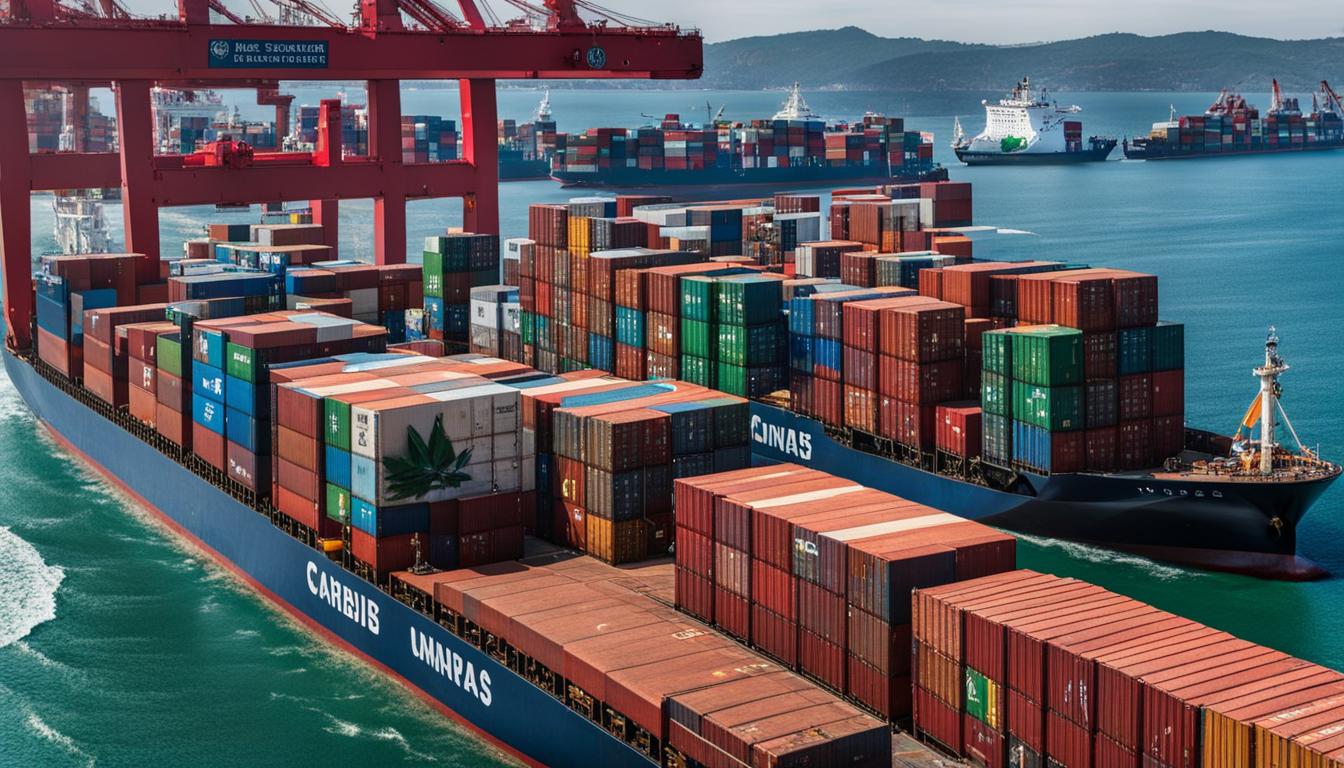Uncategorized
All Nations Cannabis: Your Ultimate Global Ganja Authority
Greetings, fellow cannabis enthusiasts! Welcome to All Nations Cannabis, your ultimate resource for navigating the exciting cannabis world globally. Whether you’re a curious traveller, an aspiring cannabis entrepreneur, or simply eager to expand your knowledge about the international cannabis industry, you’ve come to the right place.
Cannabis laws and regulations vary from nation to nation, creating a complex landscape requiring a comprehensive understanding. Our mission is to provide you with valuable insights into the legalization efforts, laws, and market trends of cannabis in different countries. By staying informed about the global cannabis market, you can make informed decisions regarding consumption, business ventures, or exploring new opportunities worldwide.
So, fasten your seatbelts as we embark on this exciting journey together. Let’s dive into the fascinating world of All Nations Cannabis and uncover the wonders of worldwide cannabis.
Key Takeaways:
- Understanding cannabis laws globally is crucial for navigating the international cannabis industry.
- The global cannabis market has experienced significant growth due to legalization efforts in various countries.
- Each country has its own regulations and restrictions when it comes to cannabis cultivation, production, retail, and consumption.
- Cannabis legalization has had an impact on criminal activity, but penalties still exist for violating cannabis laws.
- Public health and safety are important considerations in the cannabis industry, and regulations ensure product quality and testing.
Cannabis Laws and Regulations in Canada
Canada is at the forefront of the global cannabis industry, with progressive laws and regulations that have shaped the flourishing market. Individuals and businesses must understand the specific rules governing cannabis in Canada to ensure compliance and navigate the industry effectively. Let’s explore the key aspects of cannabis laws and regulations in Canada.
The Cannabis Act
The Cannabis Act, implemented in 2018, serves as the foundation for cannabis legalization in Canada. This comprehensive legislation outlines the regulations for the production, distribution, sale, and possession of cannabis throughout the country. It establishes strict guidelines and licensing requirements to ensure the safety and integrity of the industry.
Legal Possession and Consumption
Cannabis can only be legally possessed and consumed in Canada if it is obtained from licensed retailers. It is illegal to transport cannabis across the border, even if it is legal in the destination country. Those who wish to use cannabis recreationally must adhere to the specific laws and regulations within Canada.
Cannabis Retail and Distribution
The retail landscape for cannabis is tightly regulated in Canada. The government controls the licensing process for cannabis retail stores, ensuring that only authorized establishments can operate legally. Zoning restrictions, advertising limitations, and compliance with safety standards are key considerations for those entering the cannabis retail market.
Importance of Compliance
Compliance with cannabis laws and regulations is crucial for conducting business or travelling within Canada. Violations of these laws can result in severe penalties, including fines and potential criminal charges. It is important to stay updated on the evolving legal landscape and ensure adherence to the specific requirements set forth by the Cannabis Act and related regulations.
Key Regulations under the Cannabis Act
| Regulations | Description |
|---|---|
| Legal Age | Individuals must be 18 years old or the legal age set by their province to purchase, possess, or consume cannabis. |
| Licensing | Various licenses are required for different aspects of the cannabis industry, including cultivation, processing, and distribution. |
| Product Labeling | Cannabis products must be labelled accurately, providing information on potency, ingredients, and health warnings. |
| Public Consumption | Cannabis consumption is generally prohibited in public spaces, with restrictions varying by province. |
| Driving Under the Influence | Driving under the influence of cannabis is illegal and subject to penalties, similar to alcohol-impaired driving. |
Understanding the cannabis laws and regulations in Canada is essential for individuals and businesses operating within the industry. Compliance with the Cannabis Act and adherence to the specific provincial regulations ensures legal operations and promotes the safe and responsible use of cannabis in Canada.
The Global Cannabis Industry Overview
The global cannabis industry has experienced remarkable growth in recent years, driven by increasing legalization and acceptance across various regions. This burgeoning market encompasses a diverse range of products, from medical and recreational cannabis to hemp-based goods and CBD oil. Companies like All Nations Cannabis are at the forefront of this industry, leveraging advancements in cultivation, extraction, and distribution to meet the rising demand. The industry’s rapid expansion is also fueled by ongoing research into the medical benefits of cannabis, further enhancing its legitimacy and appeal.
All Nations Cannabis exemplifies the international nature of the cannabis industry, operating in multiple countries and navigating a complex web of regulatory frameworks. The company’s global footprint underscores the widespread adoption and commercialization of cannabis products. As more nations reform their cannabis laws, the market continues to evolve, presenting new opportunities and challenges. From North America to Europe and beyond, the regulatory landscape varies significantly, requiring companies to adapt their strategies to local conditions while maintaining high quality and compliance standards.
The future of the global cannabis industry looks promising, with projections indicating sustained growth and increasing market value. Innovations in technology and cultivation methods are set to drive efficiency and product diversity. All Nations Cannabis and other leading firms are poised to capitalize on these trends, investing in research and development to stay ahead in a competitive market. As societal attitudes shift and more countries recognize the economic and therapeutic potential of cannabis, the industry is likely to see further expansion and mainstream acceptance, making it a significant player in the global economy.
Making Informed Decisions in an Evolving Industry
To thrive in the global cannabis market, it is essential to comprehend the intricacies of operating within different jurisdictions. Each country imposes specific regulations and guidelines that govern the industry, affecting everything from cultivation practices to retail operations.
- Cultivation: Understanding the cultivation regulations in different countries is pivotal for businesses looking to enter the global cannabis market. From licensing requirements to quality control, complying with local regulations ensures compliance and facilitates sustainable growth.
- Retail: Cannabis retail is highly regulated in many countries, with licensing requirements and zoning restrictions playing a significant role. Knowing consumer preferences and global cannabis retail trends can help businesses tailor their offerings to specific markets.
- International Trade: Engaging in international cannabis trade requires understanding import/export regulations. Countries may have stringent requirements for importing and exporting cannabis products, including country-of-origin restrictions that must be considered.
By staying informed about cannabis market trends, industry regulations, and international trade dynamics, businesses and individuals can make informed decisions and capitalize on the vast opportunities in the global cannabis industry.
The Benefits of a Growing Industry
The benefits of a growing industry are manifold, particularly evident in sectors like cannabis, with companies such as All Nations Cannabis leading the charge. Economic growth is stimulated by job creation, attracting skilled labour and boosting local economies through increased consumer spending. Moreover, innovation flourishes as research and development investments expand, driving technological advancements and product diversification. Socially, a burgeoning industry like cannabis fosters community engagement and philanthropy, supporting healthcare and education initiatives. Environmental benefits also emerge as sustainable practices become imperative, setting new standards for eco-friendly production and resource management. Overall, the growth of industries like All Nations Cannabis enriches economies and enhances societal well-being through multifaceted contributions.
Embracing a growing industry such as cannabis, exemplified by the strides of All Nations Cannabis, cultivates global competitiveness and trade opportunities. As market demand expands, businesses innovate to meet consumer needs, spurring healthy competition and improving product quality. This growth also generates tax revenues that fund public services, from infrastructure projects to healthcare advancements. Moreover, a thriving industry attracts foreign investment, bolstering international relations and promoting economic stability. Cultural attitudes evolve as industries diversify, challenging outdated norms and fostering inclusivity. By championing sustainable practices and ethical standards, companies like All Nations Cannabis pave the way for a greener, more socially responsible future while redefining the landscape of global commerce.

The Impact of Cannabis Legalization on Criminal Activity
The legalization of cannabis has shown a notable impact on criminal activity across various regions, including those where All Nations Cannabis policies have been implemented. One significant change has been the reduction in black market activities related to cannabis sales, as legal dispensaries provide a regulated and taxed alternative. This shift has deprived criminal organizations of a lucrative revenue stream, diminishing their influence and disrupting related criminal networks. Moreover, law enforcement resources previously allocated to cannabis-related offences have been redirected towards addressing more serious crimes, enhancing overall public safety.
Furthermore, the legalization of cannabis has contributed to a decrease in arrests and convictions for minor possession charges, alleviating the burden on legal systems and reducing the number of individuals entering the criminal justice system. Societal attitudes towards cannabis have also evolved, leading to a normalization of its use and a decline in associated stigmatization. However, challenges remain in ensuring equitable access to legal markets and addressing potential health and safety concerns associated with increased availability. As All Nations Cannabis policies evolve, ongoing research and adaptive regulatory frameworks will be essential in maximizing the benefits while mitigating potential drawbacks.
The Impact of Cannabis Legalization in Canada
“The legalization of cannabis in Canada has contributed to a significant reduction in cannabis-related crime rates. However, individuals must still adhere to the legal limits and regulations to avoid criminal penalties.” – Inspector Andrea Burr, Royal Canadian Mounted Police
| Type of Offence | Criminal Penalties |
|---|---|
| Possession over the legal limit | Fines, possible imprisonment |
| Illegal distribution or sale | Significant fines, possible imprisonment |
| Taking cannabis across borders without authorization | Customs violations, fines, possible imprisonment |
It is important to understand that while cannabis is legal, there are still legal boundaries that must be respected. By doing so, individuals can enjoy the benefits of cannabis while ensuring their actions do not contribute to criminal activity or have negative consequences.
The Role of Cannabis in Public Health and Safety
The role of cannabis in public health and safety is evolving as more nations, including those in Europe, Canada, and the United States, reconsider their regulatory frameworks. All Nations Cannabis, a prominent advocate for responsible cannabis use, emphasizes education and harm reduction strategies. Proponents argue that regulated access to cannabis can reduce illegal market activities, ensuring product safety and quality through stringent controls. However, concerns persist regarding impaired driving and long-term health effects, necessitating ongoing research and robust public education campaigns.
In many regions, such as South America and parts of Asia, attitudes towards cannabis are shifting, influenced by initiatives like All Nations Cannabis that promote evidence-based policies. Advocates stress the potential medical benefits of cannabis, such as pain management and epilepsy treatment, under medical supervision. Nevertheless, ensuring equitable access while safeguarding public health remains a delicate balance. Jurisdictions face challenges in crafting policies that address both the therapeutic potential and societal risks associated with cannabis use.
All Nations Cannabis champions inclusive dialogue among stakeholders, advocating for policies prioritizing public health and safety. By fostering research collaborations and community engagement, they aim to mitigate the negative consequences of cannabis misuse. Effective regulation, informed by data and public feedback, is crucial in shaping a future where cannabis contributes positively to public health outcomes worldwide.
Cannabis Testing and Quality Control
Cannabis testing and quality control are critical aspects of ensuring safety and efficacy in the burgeoning cannabis industry. All Nations Cannabis, a leading authority in cannabis cultivation and distribution, prioritizes rigorous testing protocols to guarantee product quality. Through comprehensive analysis, including potency testing for THC and CBD levels, microbial screening, pesticide residue analysis, and terpene profiling, All Nations Cannabis maintains high standards across its product line. These measures not only comply with regulatory requirements but also reassure consumers of the purity and consistency of their cannabis products.
With advancements in testing technology and methodologies, All Nations Cannabis remains at the forefront, continually refining its testing procedures to reflect the latest scientific developments. By investing in state-of-the-art equipment and employing skilled professionals, they uphold their commitment to delivering safe and reliable cannabis products. This dedication to quality control fosters consumer trust and sets a benchmark for the industry, ensuring that every product bearing the All Nations Cannabis name meets stringent quality criteria.
Cannabis Harm Reduction
Harm reduction strategies aim to minimize the negative consequences associated with cannabis use. These strategies focus on educating users about safe consumption practices, such as starting with low doses, avoiding harmful methods of administration, and refraining from driving or operating machinery while under the influence of cannabis. By promoting responsible use and providing harm-reduction resources, public health organizations strive to reduce the potential risks associated with cannabis consumption.

Cannabis Cultivation and Production Regulations
All Nations Cannabis faces a complex landscape of regulations governing cannabis cultivation and production worldwide. These regulations span from stringent licensing requirements to environmental compliance standards, ensuring safety and quality in the industry. In countries like Canada and parts of the United States, stringent guidelines are in place to monitor every stage of cultivation, from seed to sale, to uphold product purity and potency. All Nations Cannabis navigates these regulations meticulously, employing experts in legal frameworks to ensure compliance and operational efficiency. These measures safeguard consumer health and foster trust in a burgeoning market.
The global cannabis market’s expansion necessitates adaptable strategies for All Nations Cannabis to navigate varying regulations across regions. In Europe, for instance, regulations focus heavily on traceability and testing protocols to uphold product safety. Meanwhile, in emerging markets in South America and Africa, regulations are evolving to balance economic opportunities with environmental conservation. All Nations Cannabis engages in proactive dialogue with regulatory bodies worldwide, advocating for industry best practices while ensuring their operations meet or exceed local standards. By embracing regulatory compliance as a cornerstone of its operations, All Nations Cannabis sets a precedent for responsible growth and innovation in the cannabis industry globally.

Cannabis Consumer Preferences
Cannabis consumer preferences are evolving rapidly, reflecting diverse tastes and needs across demographics. At All Nations Cannabis, understanding these preferences is crucial for tailoring products that meet market demands. From seasoned users seeking high-potency strains for therapeutic benefits to novices exploring milder options for recreational use, the spectrum of consumer choice is broad. Factors such as strain type, THC/CBD content, and consumption methods like vaping or edibles all play pivotal roles in shaping these preferences. With an increasing focus on wellness and sustainable practices, there’s also a growing demand for organically grown cannabis products at All Nations Cannabis, appealing to eco-conscious consumers.
Navigating this dynamic landscape requires a deep understanding of regional regulations and cultural attitudes towards cannabis. All Nations Cannabis recognizes the importance of compliance and cultural sensitivity in catering to global markets. Preferences for specific cannabis derivatives, such as oils or concentrates, vary widely across continents, influencing product development and marketing strategies. By staying attuned to these nuances, All Nations Cannabis positions itself as a leader in the industry, adept at meeting consumer preferences while adhering to ethical standards and regulatory frameworks worldwide.
International Cannabis Trade and Import/Export Regulations
The international cannabis trade landscape is evolving rapidly, shaped by varying regulations on import and export across nations. Entities like All Nations Cannabis navigate a complex web of legal frameworks, from stringent restrictions in some countries to burgeoning markets embracing legalization elsewhere. Regulatory challenges range from licensing requirements to quality control standards, reflecting divergent attitudes towards cannabis globally. Trade dynamics are further influenced by geopolitical factors and evolving public perceptions, driving a delicate balance between economic opportunities and regulatory compliance.
All Nations Cannabis is pivotal in navigating these intricacies and leveraging compliance and market adaptation expertise. Their operations span jurisdictions with contrasting regulatory climates, requiring meticulous strategy to ensure seamless cross-border transactions. As international norms around cannabis continue to evolve, stakeholders like All Nations Cannabis adapt strategies to capitalize on emerging markets while adhering to stringent legal requirements. The future of the international cannabis trade hinges on continued dialogue and adaptation to evolving regulatory landscapes worldwide.

Conclusion
This comprehensive guide has provided an overview of the global cannabis industry, offering valuable insights into the laws, regulations, and market trends in different nations worldwide. Understanding the legal landscape, consumer behaviours, and industry trends is essential for those interested in participating in the international cannabis market. By staying informed and adapting to the evolving regulations and trends, businesses and individuals can navigate the complex world of cannabis and discover opportunities for growth in the global market.
With the All Nations cannabis guide, you now have a valuable resource for understanding the global cannabis landscape. From Canada to countries worldwide, this guide has covered important topics such as cannabis cultivation regulations, retail restrictions, and trade regulations. By comprehensively understanding the international cannabis market, you will be well-equipped to navigate the ever-changing landscape of cannabis regulations.
As the cannabis industry continues to evolve, keeping an eye on worldwide trends is crucial. Whether it’s the legalization efforts in different countries, emerging consumer preferences, or advancements in cannabis technology, staying up-to-date is key to success in this dynamic industry. By staying informed about the global cannabis market, you can identify growth opportunities, mitigate risks, and make informed business decisions.
FAQ
What is the All Nations Cannabis guide?
The All Nations Cannabis Guide is a comprehensive resource that provides an overview of the cannabis industry, including laws, regulations, and market trends in different countries worldwide.
What are the cannabis laws and regulations in Canada?
In Canada, cannabis is legal for recreational and medical use. However, specific regulations are surrounding its possession, consumption, and distribution. It is important to know these laws when conducting business or travelling within the country.
What is the current state of the global cannabis industry?
The global cannabis industry has experienced significant growth in recent years. With the legalization of cannabis in various countries, it has become a multi-billion-dollar market, offering various opportunities for cultivation, extraction, retail, and export.
How has cannabis legalization impacted crime rates?
In countries like Canada, cannabis legalization has resulted in a decrease in cannabis-related drug offences. However, there are still penalties for violating cannabis laws, such as possession over the limit or illegal distribution. It is important to be aware of the potential legal consequences.
What role does cannabis play in public health and safety?
Public health and safety are key considerations in the cannabis industry. Regulatory bodies implement strict safety and quality regulations to ensure that cannabis products meet certain standards. Testing labs and public education initiatives also contribute to ensuring safe cannabis use.
What are the regulations for cannabis cultivation and production?
Cannabis cultivation and production regulations vary from country to country. Some countries have strict licensing and oversight requirements, while others have more relaxed regulations. Understanding these specific requirements is crucial for those involved in growing cannabis.
How are cannabis retail and consumer trends shaping the market?
The retail aspect of the cannabis industry is highly regulated, with licensing requirements, zoning restrictions, and limitations on advertising. Consumer preferences and trends play a significant role in shaping the retail landscape. Understanding these regulations and consumer behaviours is crucial for businesses.
What are the regulations for international cannabis trade and import/export?
The international trade of cannabis is subject to various regulations and restrictions. Different countries have specific requirements for importing and exporting cannabis products, including restrictions on countries of origin. Importing cannabis seeds may also be subject to limitations.
What does this guide aim to provide?
This guide aims to provide a comprehensive understanding of the global cannabis industry, including laws, regulations, market trends, and growth opportunities. It is a valuable resource for anyone interested in participating in the international cannabis market.

